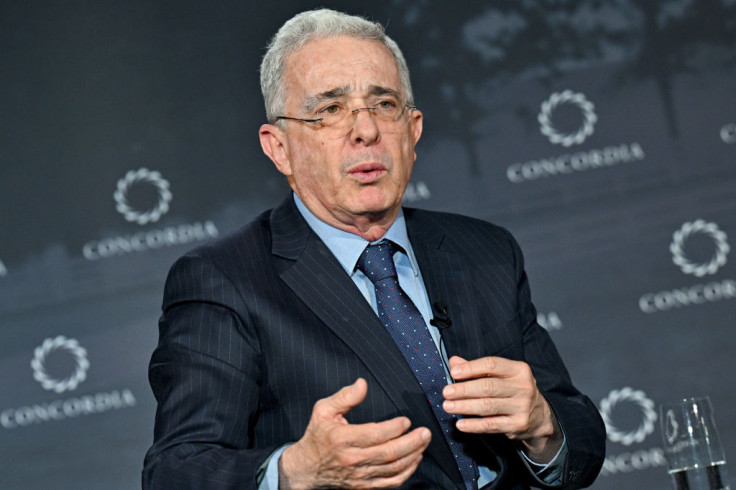
Álvaro Uribe, Colombian president between 2002 and 2010, was found guilty of bribing witnesses and abuse of process by a Bogotá court on Monday, making him the country's first former president to be criminally convicted.
Judge Sandra Heredia Aranda said it was "proven" that Uribe and his legal team tried to flip witnesses who were due to testify to his involvement with right-wing paramilitary organizations in a separate criminal investigation that ended in 2018.
The case has polarized Colombia, where Uribe remains highly influential, and attracted keen interest from Washington, where the former president enjoys support from prominent politicians including Secretary of State Marco Rubio, who slammed the sentence.
Uribe was convicted on charges of bribing witnesses and abuse of process, each carrying up to 12 year prison terms. Heredia is expected to announce the sentence in a separate hearing on Friday.
"This is not the end of this process, the appeal is next and we are going to demonstrate that this decision, which we respect, is wrong," said Juan Felipe Amaya, a member of Uribe's legal team, following the ruling.
The scandal has been a fixture of Colombian politics since 2012, when left-wing Senator Ivan Cepeda said Uribe and his brother Santiago had founded the Metro Bloc of the United Self-Defense Forces of Colombia (AUC), a right-wing paramilitary group classified as a terrorist organization by the United States.
Uribe responded by accusing Cepeda of libel, leading the Supreme Court to investigate the Senator. But the case took a dramatic turn in 2018 when the Supreme Court dropped its probe into Cepeda and announced a new investigation into Uribe, then a Senator, for tampering with witnesses due to testify against him in Cepeda's favor.
It later emerged that the court had obtained recordings of conversations between Uribe and his lawyer, Diego Cadena, in which they discussed how to stop two former paramilitary fighters from testifying against him, a piece of evidence key to the court's ruling.
"Historically speaking, this is huge, because never in Colombia's history... was a former president held accountable for anything that they did," said Sergio Guzmán, Director at Colombia Risk Analysis, a Bogotá-based political risk consultancy.
Uribe was not formally charged until May 2024, and his trial began in February this year.
There are fears that the verdict will aggravate an already polarized political climate in Colombia, where a protegé of Uribe's, senator and presidential hopeful Miguel Uribe Turbay (not related to each other), was shot at a campaign event in June.
"I think it's going to be problematic because all sides are dug in... and they're not going to change their mind," Guzmán told the Latin Times.
With elections scheduled for 2026, the trial has been a key talking point for presidential hopefuls.
Candidates on the right have condemned it, saying the case has been politicized and maintaining Uribe's innocence, while left-wing hopefuls see it as delayed justice against Uribe, who has been accused of widespread human rights abuses linked to paramilitary groups.
But the court maintained the trial was not political, with Judge Heredia saying during her ruling: "this is not a trial against Colombia's political history, it is not revenge, it is not an act of opposition, it is an act of justice and only justice."
Uribe was also a close ally of Washington during his time as president. Back then, Colombia was the largest benefactor of US military aid outside the Middle East as a result of Plan Colombia – a campaign against drug trafficking organizations and leftist armed groups, notably the now demobilized Revolutionary Armed Forces of Colombia (FARC) guerillas.
The campaign's success in reducing coca cultivation and decimating rebel forces has afforded Uribe lasting popularity among many Colombians.
But he remains a polarizing figure, with his detractors citing his links to drug trafficking and paramilitary organizations responsible for grave human rights abuses.
The politician has been accused of being involved with criminal groups as far back as the early 1980s, when the Civil Aviation Agency granted licenses to drug traffickers while under his command.
Declassified State Department cables from the 1990s also show US officials were informed that Uribe was linked to cartels while serving as Governor of Antioquia, the department where Pablo Escobar's Medellin Cartel was based.
Another memo from 2004 shows a Pentagon deputy telling Secretary of Defense Donald Rumsfeld that "Uribe almost certainly had dealings with the paramilitaries" in the 1990s.
Despite these controversies, Uribe remains one of Colombia's most powerful political figures and an influential voice in the Democratic Center party, which he founded in 2013.
© 2025 Latin Times. All rights reserved. Do not reproduce without permission.









